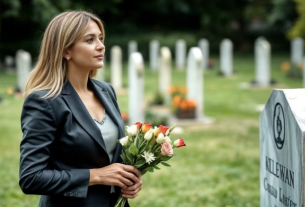Don’t expect to live here under Christ’s protection,” the stepfather’s voice cut through the silence like a knife. “Your mother is dead, and with her passing, all your privileges are over.”
I stood in the entrance hall of the house I once considered my own, clutching the handle of an old suitcase. After three years away, I had become a stranger here.
Gennady Pavlovich towered before me—massive, with the heavy gaze of a man for whom power was not merely a habitual condition, but a way of life.
“I need a little time to collect my thoughts. I’m going through a difficult period right now,” I said, my voice softer than I would have liked.
“Collect your thoughts?” he sneered in a semblance of a smile. “In my house, I make all the decisions, Anastasia. If you stay, you’ll work. After your mother’s death, everything belongs to me. Every nail, every meter of land.”
Behind him, the living room was visible—the pride of our mother, adorned with embroidery and photographs in birch frames.
On the chest of drawers, her smiling face among flowers in the conservatory that she had built with her own hands, a venture that became her life’s work.
“If you decide to stay,” he continued as he removed his expensive jacket and threw it onto an antique armchair, “you will serve as the house servant. You will cook, clean, and do the laundry. As it should be.”
His tone dripped with the pleasure he took in his own authority.
“Servant?” I echoed, feeling my cheeks start to burn.
“Exactly,” he said as he strode toward the kitchen and pulled a bottle of Château Margaux from the refrigerator—the wine that mother had reserved for special occasions. “Your room upstairs remains untouched. Settle in. Tomorrow, you’ll get your list of chores.”
I climbed the stairs, where every step held memories of the times my mother and I laughed as we passed each other.
My room had truly frozen in time: a bed with a patchwork quilt, bookshelves filled with Russian classics, a desk by the window overlooking the garden.
Sitting on the edge of the bed, I looked at my hands—calloused from work, nails broken. The hands of a twenty-five-year-old woman who had lost everything: her job at a prestigious publishing house, her apartment, her relationship with Maxim, who had called our liaison “a beautiful mistake.”
In my mind, I could hear Mother’s words, spoken calmly as if it were an ordinary conversation: “Everything will be yours, Nastya. I’ve taken care of the documents.” That had been a month before she died. She had fought her illness but continued to work until her last day, like a captain who never abandons her ship.
We sat in the garden under an old apple tree, drinking blackcurrant compote, and she had spoken so casually: “The house, the land, the business—they’re all legally yours.” At the time, I had just waved it off—Mother seemed eternal. Four weeks later, her heart, worn out by years of labor, gave out.
I had rushed back from the city only to see her serene face in memory.
Now, six months later, I had returned to the house that had become a symbol of my defeat. Penniless, with no prospects, an emptiness inside, and a growing suspicion that matters had moved too quickly—and too strangely—after her death.
The business, the house—everything had instantly passed into the hands of Gennady Pavlovich, whom Mother had always kept at arm’s length, despite our shared surname.
A car engine roared up outside. I approached the window. A black Range Rover had stopped by the porch.
Two people stepped out of the car: the first, dressed in an expensive suit, gestured wildly as if explaining something to my stepfather. The second held a leather folder silently.
They entered the house, and soon muffled voices emerged from my stepfather’s study. I quietly descended the stairs. An old floorboard creaked treacherously, but the conversation did not stop.
“…the land under the greenhouses is now entirely at my disposal,” my stepfather declared smugly. “Negotiations with the developers can begin tomorrow.”
“And what about the inheritance documents?” asked the guest. “Everything is legally in order?”
“Absolutely,” my stepfather laughed. “Who’s going to dig? His daughter? She can’t even recall what papers she signed.”
My head pounded. Papers? I hadn’t signed anything—I was in such a state that I could barely distinguish the faces around me.
But inside, something clicked, as if the final piece of the puzzle had fallen into place. My mind cleared.
I quietly retraced my steps upstairs, closed the door, and exhaled. A plan began to form in my mind—a clear, cold plan that required patience.
I was not going to be a servant in the house built by my mother. I would become a hunter, stalking my prey.
If Mother had left a will—I would find it.
The world around me became sharper, as if before a storm, charged with electricity. I knew: the game was beginning, with everything I held dear at stake.
And I wasn’t going to lose.
The morning began with a loud knock at the door.
“Up!,” my stepfather’s voice intruded into my sleep like an uninvited guest. “Breakfast is in fifteen minutes. And don’t forget about the greenhouses.”
I dressed, tied my hair in a bun. In the mirror, I saw not yesterday’s confusion, but the determination of someone who had found her purpose.
In the kitchen, Gennady Pavlovich was studying stock market reports, sipping coffee from Mother’s favorite cup adorned with forget-me-nots. That gesture caused me almost physical pain.
“A list of chores,” he said, extending a sheet of paper scrawled in loose handwriting. “And remember your place.”
I took the list, trying not to let my shaking hands betray me. Cleaning, laundry, cooking, greenhouses—a full set of duties.
“Of course,” I replied evenly, as if agreeing to serve tea.
He raised an eyebrow in surprise, clearly expecting resistance.
“Well then, splendid. I have a business lunch in the city. I’ll be back by three. Make sure the house shines.”
After the door slammed, I tossed aside the list and began methodically inspecting the house—room by room, closet by closet.
I knew Mother’s habits better than my own.
In her bedroom now reeked someone else’s taste: instead of light curtains, there were velvet drapes; instead of books, there was a collection of crystal figurines.
I checked every drawer, looked under the mattress—without success.
The stepfather’s study was locked. It was too early for an open confrontation—irrefutable evidence was needed.
By lunchtime, I had managed to redo most of the household chores, but my thoughts kept returning to the main mystery—where could Mother’s will have disappeared?
Gennady Pavlovich returned, clearly in a foul mood. He threw his coat onto the back of the sofa and headed to the kitchen, sniffing disapprovingly.
“What is that smell?” His face twisted as if he had detected something rotten.
“Trout with Provencal herbs,” I answered as I continued stirring a sauce made of white wine and tarragon.
“Trout?!” he wrinkled his nose in disgust. “I can’t stand fish. Throw that rubbish out and make something acceptable.”
I silently turned off the stove. Inside me, anger simmered, but at that moment, any confrontation would have been a mistake.
“And attend to my shirts,” he added, opening the refrigerator. “They’re in the bathroom.”
Nodding, I headed to the bathroom. The laundry basket was filled with expensive shirts and silk ties. As I sifted through the clothes, my fingers accidentally found a thick rectangle in the breast pocket of one of the shirts. It was a business card: “Viktor Semyonovich Klimov, Notary.”
That name immediately struck a chord. It was precisely him Mother had mentioned when talking about the will. I hid the card and loaded the washing machine. The plan was taking shape.
In the evening, while my stepfather settled before the television with a glass of whiskey, I grabbed some gardening tools and went out to the yard, pretending to be on my way to tidy up the flowerbeds. In reality, I needed to inspect the old shed that Mother called her “archive.”
The shed was cluttered with gardening equipment and pots. In a corner stood a darkened wooden chest, which, judging by everything, my stepfather had neglected. Opening the lid, I discovered gardening gloves, albums of pressed flowers, magazines, and at the very bottom—a simple key.
I froze. The buffet! Mother’s antique oak buffet in the living room, which had always been locked, under the pretext of “family heirlooms.”
Returning to the house, I feigned fatigue. My stepfather didn’t even glance at me as I passed by with a bucket and mop.
“The floor in the living room,” I said, deliberately nonchalant.
“Just be quiet,” he muttered without looking up from the screen.
The living room was fading into dusk. The massive buffet darkened against the wall. I carefully inserted the key into its lock—it fit perfectly. The door creaked open almost soundlessly.
Inside lay neatly stacked piles of old papers, photo albums, and various small chests. I hurriedly scanned through the documents until I found a thick envelope. My heart pounded as if its beating might wake the whole house.
With trembling hands, I pulled out the contents—a copy of the will. Skimming over the text, a chill of determination ran through me.
“…all property, including the house, the plot, the greenhouse complex, the “Forget-Me-Not” business, and the bank accounts, I bequeath to my only daughter, Anastasia Igorevna Svetlova…”
Mother’s signature—executed with her characteristic flourish. But she had not managed to formally execute it.
Inside the envelope was also a worn audio cassette labeled “Conversation with Irina about the inheritance.” Irina Stepanovna—Mother’s close friend and confidante.
“What are you doing there?” My stepfather’s voice struck like a lash.
I flinched, but managed to hide the discovery behind my back.
“Just… cleaning the shelves,” I said, my voice sounding almost natural.
“In the dark?” He switched on the light. His eyes fell on the open doors of the buffet. “Who allowed you to go through that?”
“I was looking for some cleaning rags,” I lied. “Mother stored household items here.”
He narrowed his eyes, clearly not believing a word.
“Close it immediately and forget about the buffet. Those are family things, and you have no right to them.”
“Of course,” I replied submissively, leaving the key in the lock. The envelope had burned through my sweater’s back.
My stepfather hesitated, then waved his hand dismissively:
“Finish up and go to sleep. Tomorrow, you’ll resume your duties.”
After he left, I exhaled in relief and took out the envelope. Now I had a crucial trump card. But that wasn’t enough. I needed further evidence to expose the document forgery.
I hid the envelope under a floorboard in my room. The plan was becoming ever clearer. But the hardest part was yet to come—forcing my stepfather to reveal the truth.
The next morning I went down to the kitchen with a tape recorder in my pocket.
“What do you plan to do today?” I asked, pouring him some coffee.
Gennady Pavlovich tore his eyes away from the newspaper, surprised by my interest.
“Since when are you concerned with my affairs?”
“Just curious,” I shrugged as I turned on the tape recorder. “You’re managing Mother’s business now. It must be difficult to keep track of all these varieties and technologies?”
“Not any harder than placing signatures where they need to go,” he smirked while sipping his coffee. “By the way, you brewed a decent cup.”
“Thank you,” I paused. “You know, yesterday I was remembering Mother. Didn’t she leave anything for me? Perhaps there was an error somewhere?”
His hand trembled; a drop of coffee fell onto the newspaper, blotting it.
“Absolute nonsense,” he snapped. “There was no will in your favor.”
“And what if I find it?”
His face changed—now before me was a predator that had sensed danger.
“So, you’ve been snooping in the buffet?” he demanded.
“So you know about the will?” I advanced.
He leapt up, looming over me.
“Listen carefully, girl. Your mother was naive! Who’s to blame that she kept important documents just anywhere? She didn’t manage to formalize anything properly. I arranged everything in a matter of days while you and that old hag were scrambling through funeral homes!”
My heart pounded. He had practically admitted it! The tape recorder captured every word.
“Did you forge the documents?” I asked, maintaining my composure.
“Let’s call it a creative approach to solving legal issues,” he laughed with cold cynicism.
“Who do you think will believe a pauper who returned from the city with not a penny in her pocket against a respected businessman? I have connections and money. And you?”
“I have the truth,” I stood up. “And evidence.”
He froze, realizing he had said too much.
“What other evidence?” he spat, grabbing my hand.
“A genuine copy of the will. An audio recording of Mom’s conversation with Irina Stepanovna. And now—your own confession.”
I freed my hand and revealed the tape recorder. His face twisted in rage.
“You…,” he gasped furiously. “You won’t prove a thing! I’ll destroy you!”
“Doubtful,” I replied, backing toward the exit. “The game is over, Gennady Pavlovich.”
He lunged at me, but I was quicker—I dashed out of the kitchen, grabbed my jacket, and ran out of the house.
My first stop was the city’s notary office, to see Viktor Semyonovich.
The graying man with sorrowful eyes recognized me at once.
“Anastasia!” he exclaimed, rising from behind his desk. “I tried to find you after the funeral, but you seemed to have vanished…”
“My stepfather himself forged the documents to rewrite everything in his favor,” I snapped, handing over the envelope with the will.
His face went pale as he took the document with trembling hands.
“My God… Where did you find this?”
“In Mother’s buffet,” I explained, playing the tape recorder. “And I have his confession.”
Viktor Semyonovich listened to the recording, and his face grew steadily determined.
“I will help you,” he said firmly when the recording ended. “Your mother truly intended to leave everything to you. But she didn’t manage to process the documents formally. Then I was presented with another will… I thought she had changed her mind.”
“That one is a forgery.”
After meeting with the notary, I visited Irina Stepanovna—Mother’s close friend. The silver-haired woman, with kind wrinkles around her eyes, burst into tears upon seeing me at the doorway.
“Nastya, darling! I’ve been waiting for you to show up…”
We sat together in her cozy kitchen, and I played the old cassette. Mother’s familiar, vibrant voice spoke of plans, of the will, of everything meant to be mine.
“I always felt that something was off,” Irina sighed. “Your stepfather arranged everything too quickly. I even went to the police, but they said—without concrete evidence, there was nothing they could do.”
“Now we have the evidence,” I said, squeezing her hand.
The next two weeks turned into a true legal battle. I hired an attorney—a young but principled man named Dmitry Valeryevich.
We filed a lawsuit to annul the will and have the property returned to its rightful heir.
The case materials included the original copy of the will, the audio recording of Mother’s conversation, the tape recording of my stepfather’s confession, and an expert opinion.
Gennady Pavlovich hired expensive lawyers, issued threats, and even tried to bribe the judge. But the facts were irrefutable.
At the final hearing, he looked utterly defeated.
“All of this could have been avoided,” I stated before the proceedings began. “If only you had followed Mother’s wishes.”
“You have no idea what you’ve gotten yourself into,” he hissed. “I’ll be back.”
The judge cleared his throat and removed his glasses, surveying the courtroom with a measured gaze.
“Having considered all the case materials, the court concludes that the document presented by Mr. Svetlov as the last will of Elena Igorevna is a forgery,” his voice—calm yet firm—made me grip the armrests of my chair.
“The court hereby restores justice.”
The house where I grew up, the land where Mother had toiled, the greenhouse complex, and the flower business “Forget-Me-Not,” established through her hard work, as well as all the funds in her accounts—everything is returned to the rightful heir, as stipulated in the genuine will.
Applause broke out in the courtroom—from the women who worked in Mother’s greenhouses, the neighbors, and family friends.
“Moreover,” continued the judge, “the court finds the evidence of fraud on the part of Mr. Svetlov sufficient to initiate criminal proceedings. The materials have been forwarded to the investigative committee.”
Gennady Pavlovich slumped onto a bench, covering his face with his hands.
I stood in the center of the living room, now restored to mine. April sunlight filtered through the linen curtains—I had thrown out my stepfather’s heavy drapes to reveal Mother’s embroidered cornflowers along the edges.
The buffet was open—I began sorting through the family photographs for a new album.
Three months had passed since the court’s decision. Gennady Pavlovich was sentenced to a lengthy prison term for large-scale fraud.
Mother’s business was slowly coming back to life—I reinstated all the employees he had fired to cut costs.
Irina Stepanovna helped with the bookkeeping, and Viktor Semyonovich became the legal consultant for “Forget-Me-Not.”
Yesterday, for the first time in a long while, I visited Mother’s grave, bringing a bouquet of flowers from our greenhouses.
I sat next to her granite monument, recounting everything as if she could hear every word.
On the chest of drawers stood her photograph—smiling among the flowers, as if she knew something important. I approached it and straightened the silver frame.
“Mother,” I whispered, “I have protected what you left me. I became strong because of you.”
In the greenhouses, a new batch of flowers was ripening for the city festival. Life goes on.
I am no longer a servant.
I am the mistress.
I am Anastasia, and I have reclaimed what is rightfully mine.



